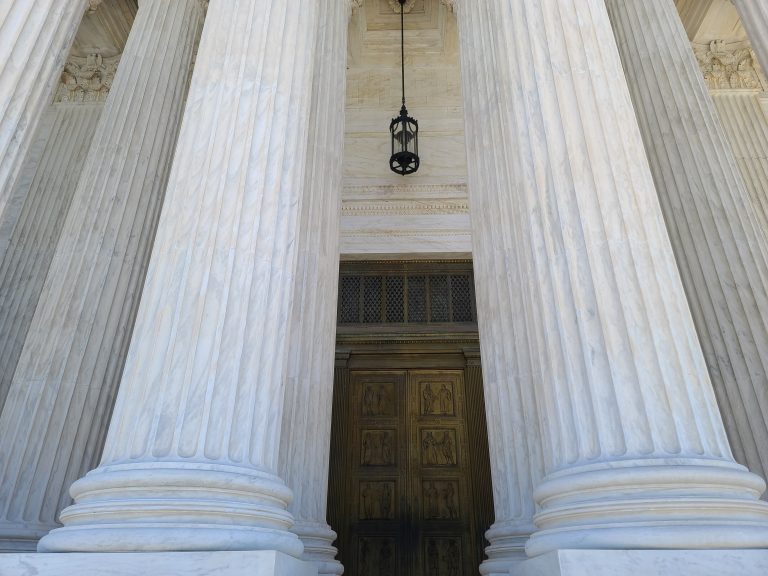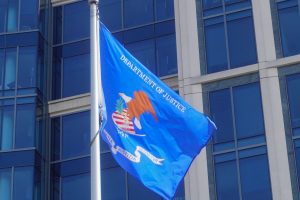The National Rifle Association may soon achieve its first significant win in quite a while.
This week, the Supreme Court heard oral arguments in the struggling gun-rights behemoth’s First Amendment case against a former New York financial regulator. While predicting the outcome of a case based solely on what happens in arguments is perilous, the questions asked by the justices can provide some insight into how they feel about the case. In NRA v. Vullo, a sizable majority of the Court seemed on board with the idea the gun group’s rights were abused.
Let’s start with the most vocal justices.
Those would be Justice Samuel Alito and Justice Kentaji Brown Jackson. Perhaps unsurprisingly, their questions tended to be aimed in opposite directions.
Alito focused much of his time on the line between government persuasion and coercion. He not only seemed to believe that Maria Vullo’s attempt to convince insurance companies to cut off business with the NRA over its “gun promotion” effort was a violation of the First Amendment but a pretty overwrought one at that.
“They gilded the lily or whatever the phrase is,” he said at one point. “I mean, they were ham-handed about this. The people up in New York are rubes. They don’t really understand how to do this.”
The thrust of most of his questioning was not whether Vullo’s letter warning the companies about the “reputational risk” of working with the NRA or her alleged February 18th, 2018 meeting with a Lloyds of London executive telling them she’d go easier on the company’s infractions if they dropped the gun group were coercive, but whether a more “sophisticated” approach would also violate the First Amendment. He was highly skeptical the guidance letter Vullo sent warning insurers about the NRA’s politics weren’t clear threats on their own.
“I mean, seriously, you think that sophisticated insurance companies are not taking into account adverse risks?” he asked Vullo’s lawyer. “They probably had heard about the Parkland shooting and the aftermath of it. You think they hadn’t already taken this into account, and didn’t they already know all the power that Ms. Vullo had over them?”
In contrast, Justice Jackson was more focused on the idea that Vullo’s actions stemmed primarily from a legitimate violation of the law by the NRA and its insurers. She was concerned that an overly broad application of the NRA’s defense could effectively make it impossible to regulate the conduct of advocacy groups.
“What I’m worried about is your position ultimately reducing to anytime a regulator enforces the law against an entity that does business with an advocacy organization, we have a First Amendment violation,” she said. “Because it seemed like your answer to him was, well, what gets this into the First Amendment column, unlike other scenarios, is that the NRA advocates for guns, and it’s an
advocacy organization, and so action taken against it makes it a First Amendment violation.”
Justice Elana Kagan brought up a similar concern about Vullo’s warnings over the “reputational risk” of working with the NRA.
“But that idea of reputational risk, Mr. Cole, that is a real idea, right? It wasn’t invented for the NRA,” she said. “There is a view that bank regulators have that companies are supposed to look at their reputational risks. It might be that gun advocacy groups, gun companies do impose reputational risks of the kind that bank regulators are concerned about.”
Justice Sonya Sotomayor also questioned the idea that the consent decrees the insurance companies signed agreeing to end all business with the NRA were a problem in and of themselves.
“I’m not sure the consent decrees could be viewed as selective prosecution when there is no question, I don’t believe that the Carry Guard insurance policies had provisions that violated New York law,” she said. “They reimbursed for criminal activity, and they reimbursed for intentional acts, which New York insurance law clearly says you can’t do.”
Still, all three liberal justices expressed concerns with Vullo’s actions.
While Sotomayor noted some parts of the insurance offered by the NRA and its partners were illegal, she questioned why Vullo forced them to stop doing business with the NRA altogether nationwide.
“These affinity programs could have been altered,” she said. “And these consent decrees and what she was seeking was a ban, even of potentially lawful affinity programs. I mean, if they had taken out the intentionality provision or the criminal activity provision and just insured for accidents with guns or things like that, those would have been lawful. She went further…”
Kagan implied that Vullo’s February 18th meeting with Lloyds was an easier case to make as a First Amendment violation than the letters she sent.
“I put the Lloyd’s meeting in a different category and was really more interested in I think that this is a closer one just because if reputational risk is a real thing,” she said of Vullo’s reputation risk warning, “and if gun companies or gun advocacy groups impose that kind of reputational risk, isn’t it a bank regulator’s job to point that out?”
Similarly, Justice Jackson questioned whether the situation fits the precedent established in Bantam Books v. Sullivan because Vullo was pressuring insurance companies rather than bookstores or other speech-based businesses. However, she was more sympathetic to the idea what Vullo did might constitute retaliation based on the NRA’s speech.
“Justice Gorsuch suggests that you might have a retaliation claim, which is a kind of First Amendment, it’s a species of First Amendment,” she said. “You allege it in this case. And that makes perfect sense, right, that they’re — they’re punishing me because of my speech. That’s retaliation.”
Speaking of Justice Neil Gorsuch, he questioned the government’s insistence that the first four paragraphs of Vullo’s guidance letter would have been acceptable. The government agreed Vullo’s February 18th meeting crossed the line but tried to argue most of the guidance letter didn’t because it was persuasion rather than coercion. However, Gorsuch noted that the letter didn’t end after four paragraphs and included an implicit threat of government action.
“You agree, though, the fifth paragraph changes the calculus?” Gorsuch said.
Justice Brett Kavanaugh shared Jackson’s note that Bantam was more straightforward because the third party being pressured was directly involved in distributing somebody else’s speech. He said that made the case “a bit unusual” but concluded the distinction didn’t matter.
“I take your point that Bantam Books, as long as the ultimate action is against speech, it doesn’t matter that the intermediary is not itself a speech business,” he told the NRA’s lawyer.
He seemed to take the government’s opposition to Vullo as a significant marker in the case, too.
“Mr. Katyal, it’s a bit jarring, I guess, for me that the Solicitor General is on the other side from you in this case, given that the Solicitor General represents the United States, and as we know from the last case, has a strong interest in not expanding Bantam Books,” Kavanaugh told Vullo’s lawyer. “So how should we think about that?”
There were fewer clues about how the other conservative justices were leaning when they questioned the lawyers in the case. Justice Amy Coney Barrett asked primarily about procedural issues with the case. Justice Clarence Thomas only asked four questions, though one seemed skeptical of the idea that Vullo’s actions were in response purely to the NRA’s actions rather than its beliefs.
“Would you spend just a small amount of time explaining why you think the conduct, all of this is infected by, I guess, the one illegal insurance product involved here?” Thomas asked.
The only question Chief Justice John Roberts that might provide some insight into his thinking dealt with, again, the idea that Vullo’s actions could be justified because of the underlying issues with the NRA’s insurance policies.
“You’re not suggesting that if, for example, after the initial conduct by Ms. Vullo and the reaction of the National Rifle Association, if she instructed her staff to go through these policies and find something, you know, that violates some regulation in there, that she could then defend against — the basis of terminating all that, on the basis of those newly discovered violations?” he asked Vullo’s lawyer.
Another common thread that several justices touched on that could give reason to think the NRA stands to win the case stems from the stage the case is in. The justices won’t be deciding the case on the merits of the underlying claims. Instead, the Supreme Court is merely deciding whether to dismiss the claims without further litigating the allegations.
So, the standard for review is much lower. As Justice Alito pointed out, all the NRA has to do is show there is a plausible First Amendment claim. And that’s with the assumption the events at issue happened the way the NRA alleges.
“Mr. Katyal, you’re shifting the burden to them,” Justice Alito said. “This is a First Amendment case. All they need to do is to show that the desire to suppress speech was a motivating factor.”






